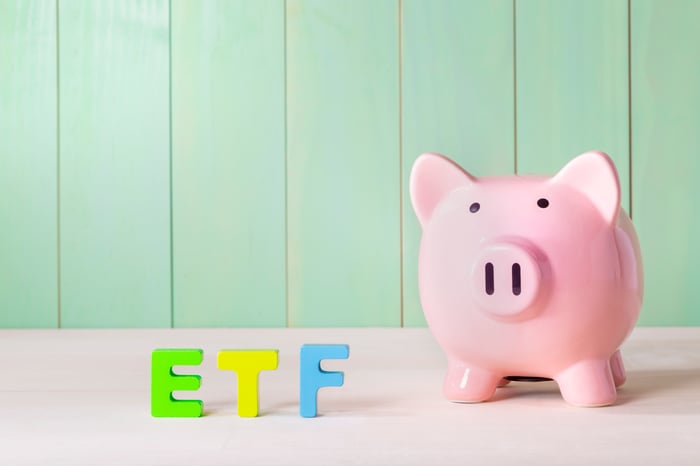Trading accounts
Platforms
News
We provide the latest news
from the world of economics and finance
We provide the latest news from the world of economics and finance
The investment landscape has been profoundly shaped by the introduction of exchange-traded funds (ETFs). This transformation owes much to the pioneering efforts of John Bogle and the Vanguard Group.
The inception of ETFs marked a significant shift in investment strategies, offering lay and professional investors an efficient vehicle to diversify their portfolios across a broad spectrum of stocks, themes, or markets.

There's one fund family that stands out from the crowd. Vanguard, a name synonymous with low-cost and tax-efficient investing, has been at the forefront of this financial innovation. With a current offering of 86 ETFs, Vanguard caters to a range of investment styles and preferences.
Notably, 50 of these funds are classified as "stock ETFs," or funds predominantly invested in equities and carrying a moderate to high risk level, as indicated by Vanguard's risk assessment scale.
The affordability of Vanguard's ETFs is a key factor in their popularity. The Vanguard S&P 500 (NYSEMKT: VOO) and the Vanguard Total Stock Market Index Fund ETF Shares (NYSEMKT: VTI) stand out as the fund's most cost-effective stock ETFs. Each has an expense ratio of just 0.03%.
On the other end of the spectrum, the Vanguard International High Dividend Yield Index Fund ETF Shares (NASDAQ: VYMI) and the Vanguard U.S. Multifactor ETF Shares (NYSEMKT: VFMF) are the most expensive, with expense ratios of 0.22% and 0.18%, respectively. Yet they still offer value with expense ratios significantly below their category average.
Performance has also been a key driver behind Vanguard's growing popularity. As of this writing, the Vanguard S&P Mid-Cap 400 Growth Index Fund ETF Shares (NYSEMKT: IVOG), the Vanguard U.S. Momentum Factor ETF Shares (NYSEMKT: VFMO), and the Vanguard S&P 500 Growth Index Fund ETF Shares (NYSEMKT: VOOG) have been its best performers in 2024.
Specifically, over this nearly five-month period, the IVOG has delivered total average returns of 10% (including distributions). The VFMO has jumped by 9.27%, and the VOOG has risen by 8%. The widely held VOO, on the other hand, has generated a 6.6% gain for shareholders since the start of 2024.
What about the fund's worst performers in 2024? The Vanguard Global ex-U.S. Real Estate Index Fund ETF Shares (NASDAQ: VNQI), the Vanguard S&P Small-Cap 600 Value Index Fund ETF Shares (NYSEMKT: VIOV), and the Vanguard S&P Small-Cap 600 Index Fund ETF Shares (NYSEMKT: VIOO) are the fund family's three worst performers nearly five months into 2024. The VNQI has dipped by 5.3%, the VIOV by 4.6%, and the VIOO by 2.3%.
What about long-term performance? Over the last 10 years, the Vanguard Information Technology Index Fund ETF Shares (NYSEMKT: VGT), the Vanguard Mega Cap Growth Index Fund (NYSEMKT: MGK), and the Vanguard Russell 1000 Growth Index Fund ETF Shares (NASDAQ: VONG) have been the best performers.
Turning to the specifics, the VGT has delivered a blistering 20.4% average annual return. The MGK has generated an average annual return of 15.8%, and the VONG has done equally well at 15.8% per year over the past 10 years.
What are the fund family's worst performers over the prior 10 years? Over this same 10-year period, the VNQI, the Vanguard Emerging Markets Stock Index Fund (NYSEMKT: VWO), and the Vanguard FTSE All-World ex-US Small-Cap Index Fund ETF Shares (NYSEMKT: VSS) performed the worst. The VNQI delivered average annual returns of 1.46%. The VWO averaged an annual gain of 3.26%, and the VSS provided shareholders with an average gain of 3.8%.
Although the VNQI, VWO, and VSS all underperformed the VOO over the prior 10 years (see graph above), they did deliver positive returns for shareholders. That's a testament to Vanguard's savvy approach to capital management. Scores of actively managed funds lost investors money over the past 10 years.
The appeal of Vanguard's ETFs extends beyond cost-efficiency and performance. The company's commitment to providing a diverse range of investment options aligns with the evolving needs of investors who are increasingly looking for specialized and thematic investment opportunities.
This approach has cemented Vanguard's position as a preferred provider for many stock investors, who value the blend of performance, cost-effectiveness, and variety offered by Vanguard's ETFs. As the ETF market continues to expand, Vanguard will surely continue to play a leading role, making the fund family an ideal choice for long-term investors.
When our analyst team has a stock tip, it can pay to listen. After all, the newsletter they have run for over a decade, Motley Fool Stock Advisor, has nearly tripled the market.*
They just revealed what they believe are the 10 best stocks for investors to buy right now…
See the 10 stocks
*Stock Advisor returns as of April 22, 2024
George Budwell has positions in Vanguard S&P 500 ETF. The Motley Fool has positions in and recommends Vanguard Index Funds-Vanguard Total Stock Market ETF, Vanguard International Equity Index Funds-Vanguard Ftse All-World ex-US Small-Cap ETF, Vanguard International Equity Index Funds-Vanguard Ftse Emerging Markets ETF, and Vanguard S&P 500 ETF. The Motley Fool has a disclosure policy.
The views and opinions expressed herein are the views and opinions of the author and do not necessarily reflect those of Nasdaq, Inc.